Politician and Journalist, Egypt
Latest Developments: On April 12, 2021, SSSP ordered the release of Dawoud. Dawoud left the prison and returned home.
Summary
Khaled Dawoud is an Egyptian journalist and politician who works as the Assistant Editor-in-Chief of Al-Ahram Weekly and an adjunct professor at the American University in Cairo (AUC). Dawoud's political and journalistic work exposed human rights violations in post-Mubarak Egypt and publicly criticized the authoritarian policies of both President Mohamed Morsi and President Abdel Fattah al-Sisi. Security forces arbitrarily arrested him on September 24, 2019, while he was on his way to visit his unwell elderly father in Cairo. The next day, Dawoud appeared before the Supreme State Security Prosecution (SSSP) as a defendant in the SSSP Case No. 488/2019, accused of collaboration with a terrorist organization, misuse of social media, and spreading false news. He was held in unlawful detention for 19 months, not permitted to communicate with his eleven-year-old son. On April 12, 2021, SSSP prosecutors ordered him released.
Methodology
DAWN researchers interviewed sources close to the detainee, investigated official documents and consulted other information from published sources that we consider to be reliable. DAWN is not disclosing the identity of the interviewees to protect their security. They are referred to here as indicated below, including the dates of the interviews:
- Interview with source A, on August 4 and 5, 2020.
- Interview with source B, on August 2 and 6, 2020.
- Interview with source C, on August 1, 2020.
- Interview with source D, on August 25, 2020.
Personal Background
Khaled Elsayed Ismail Dawoud is an Egyptian journalist and politician born on July 17, 1967 in Cairo. Dawoud graduated from the American University in Cairo in 1988 with a Bachelor of Arts in journalism and in 1990 with a Master of Arts in Television Journalism. In 1993, he graduated from the School of Oriental and African Studies (SOAS) at the University of London with a Master of Arts in Politics of the Middle East. Dawoud has a son, Basem, who resides in Morocco.
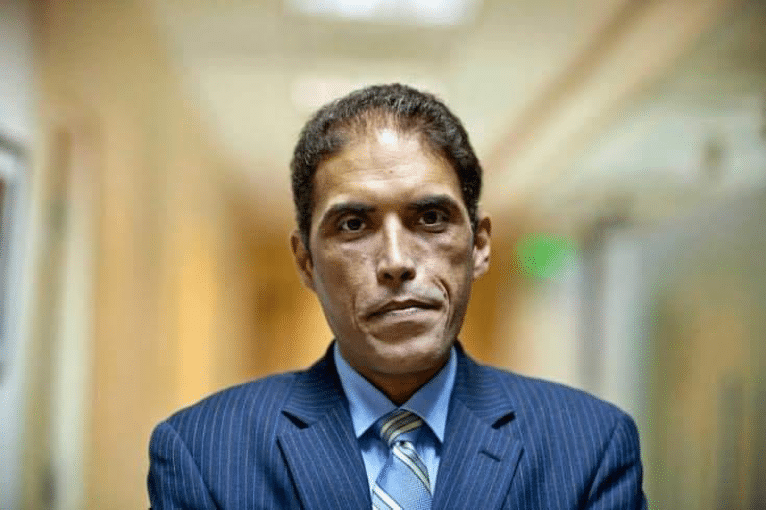
Professional Background
Dawoud is the Assistant Editor-in-Chief of Al-Ahram Weekly, an English language newspaper published by Al-Ahram Publishing House in Cairo, and an adjunct professor of Mass Media Writing at the American University in Cairo (AUC). In the 1990s and 2000s, he worked as a reporter and correspondent with Reuters, The Associated Press, Deutsche Presse-Agentur, The BBC, Al Jazeera, The Guardian and Al Ahram.
Dawoud played a notable role in the opposition to former President Mohamed Morsi after Morsi was elected in June 2012. Dawoud was the spokesperson of a leading liberal party, al-Dustour (the constitution), and the spokesperson of the National Salvation Front (NSF), a coalition of liberal, secular, and leftists groups, founded on November 24, 2012. The NSF served as the primary political opposition to the Freedom and Justice Party of the Muslim Brotherhood and supported the coup against President Morsi. However, Dawoud resigned on August 16, 2013 in protest of the NSF's support for the bloody dispersal of pro-Morsi supporters in Rabaa al-Adawiya and al-Nahda squares in Cairo. On October 4, 2013, while driving past a pro-Morsi protest in al-Qasr al-Ainy street in Cairo, Muslim Brotherhood-affiliated protesters stopped Dawoud, dragged him from his car and stabbed him repeatedly in the chest and hand with a dagger. This assault was apparently a retaliation for his role in the removal of President Morsi.
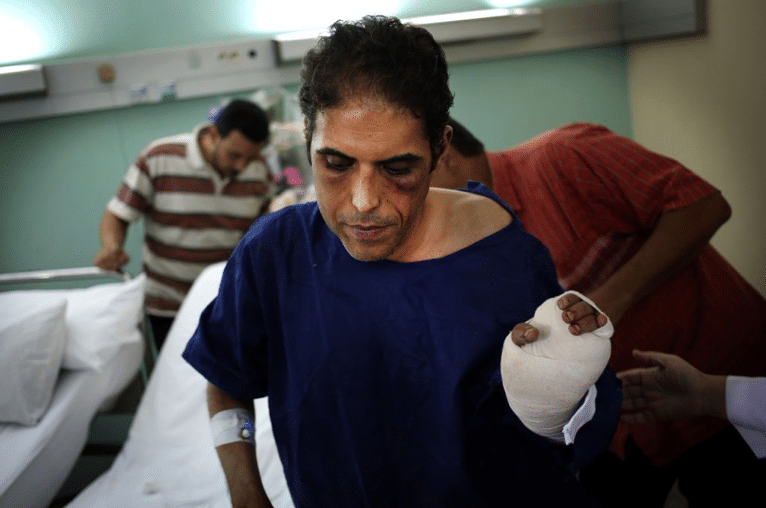
Through his writing and actions, Dawoud has consistently been a strong voice in support of democracy and human rights in Egypt. He opposed military rule during his tenure as a leader of al-Dostour party between March 17, 2017 and May 13, 2018. Later, he served as spokesperson of the Civil Democratic Movement, a coalition of liberal, leftist parties and independent public figures, founded on December 13, 2017. Their goal was to demand the release of prisoners of conscience and peaceful protesters; the amendment of the protest law; and restoring sovereignty over the Egyptian islands of Tiran and Sanafir, which al-Sisi transferred to Saudi Arabia in 2017.
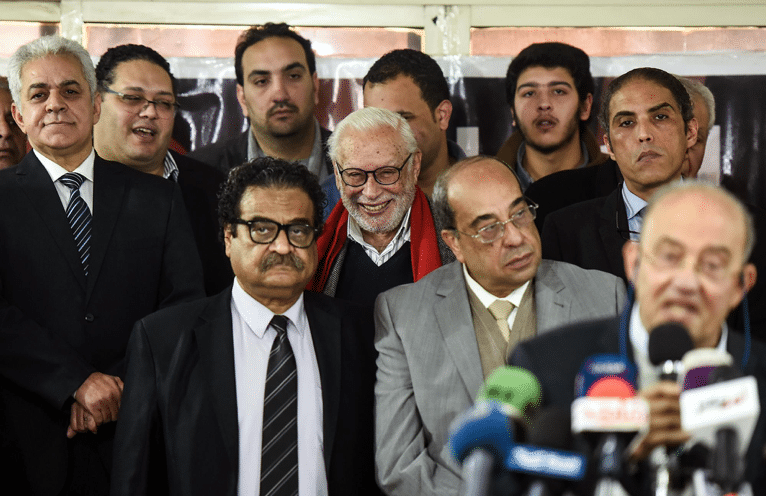
Dawoud also made many media and public statements in defense of the pro-democracy Arab movement and against President al-Sisi and his tyrannical rule. In his comments on the Sudanese and Algerian mass protests between 2018 and 2020, Dawoud stated:
The power of the people has proved to be alive, and the desire to have a president who does not stay for life, […] The model we set in 2011 remains alive despite the tremendous efforts to crush and distort it.
In April 2018, after the Egyptian parliament approved constitutional amendments that effectively removed the two-term limit on al-Sisi's presidency and could keep him in power until 2030, Dawoud opined that:
Our dream and hope to have a president who is elected once every two terms have come to an end. […] Unfortunately, the Egyptian regime is not learning the lessons of the 2011 revolution or experiences in Algeria and Sudan.
Time and Circumstances of Arrest
In September 2019, construction contractor and whistleblower Mohammed Ali, in exile in Spain, accused al-Sisi and top military generals of corruption and misuse of public funds. The accusations triggered protests on September 20-21 in which thousands of demonstrators marched to demand the resignation of President al-Sisi. These rare protests occurred in the context of a total lockdown of the public sphere. The government responded by launching what was described by Mada Masr as the most aggressive wave of arrests since al-Sisi took power in 2014.Egyptian security forces arrested Khaled Dawoud, along with Hassan Nafaa and Hazem Hosni—professors of Politics at Cairo University—even though none of them participated in these protests.
According to Source A, unidentified security forces arrested Dawoud on the evening of Tuesday, September 24, 2019, without a warrant and without giving reasons or letting him contact a lawyer or family member. He was on his way to visit his sick father, journalist Elsayed Dawoud. Source A said that the father told them that Dawoud called his father before he left his apartment to ask if his father needed anything. The elder Dawoud was alarmed when his son did not arrive. According to Source A, he sent his youngest son, Iyad, to look for his missing brother. According to Source A, parking attendants and eyewitnesses in the surrounding neighborhood told Iyad that they saw security forces taking away his brother, Khaled, from his car.
An online campaign, 'Free Khaled Dawoud,' soon demanded his release. The campaign stated that security forces arrested Dawoud while he was preparing to visit his elderly father. The campaign, run by Dawoud's friends and associates, indirectly insinuated the reason for Dawoud's arrest: he called for an investigation into Mohammed Ali's corruption claims. Ten days before his arrest, Dawoud tweeted on September 14, 2019 that "the President should be held accountable." Source C told DAWN that security forces took Dawoud to an unidentified detention center before he appeared the next day, September 25, 2019, before the Supreme State Security Prosecution (SSSP) in Cairo's Fifth Settlement.
Charges
Source C noted that the SSS prosecutor, whom DAWN could not identify, listed Dawoud as a defendant in SSSP Case No. 488/2019 and charged him with:
- Participation in a terrorist organization with knowledge of its purposes
- Spreading false news and statements
- Misuse of social media platforms
The prosecutor neither disclosed the group that Dawoud allegedly collaborated with nor cited the Egyptian penal code articles that constitute the legal basis for the levelled charges. The SSSP ordered Dawoud's pre-trial detention for 15 days pending investigation in Case No. 488/2019. Security forces then transferred Dawoud to Liman Tora Prison on September 25, 2019.
Trial and Legal Proceedings
- September 25, 2019
The SSSP listed Dawoud as a defendant in SSSP Case No. 488/2019 and accused him of participation in a terrorist organization with knowledge of its purposes, misuse of social media, and spreading false news. The prosecution provided no evidence or witnesses to support the charges against Dawoud and ordered him to pre-trial detention for 15 days pending investigation even though no evidence was presented to establish any of the statutory conditions for pre-trial detention as stipulated in Article 134 of Egypt's Code of Criminal Procedure.
- October 7, 2019
Khaled Diaa el-Din, as First Attorney General of the SSSP, extended the pre-trial detention of Dawoud for 15 days pending investigation in Case No. 488/2019.
Dawoud complained to the prosecutor in his case, whose identity was not disclosed, about the poor conditions of his detention in Liman Tora Prison and the administration's ban on his receiving clothes and personal belongings from his family—all things that the administration permits prisoners accused of non-political crimes to have.
Dawoud's lawyers requested his release on the ground that he has known residential and work addresses in accordance with Article 143 of Egypt's Code of Criminal Procedure No. 150 of 1950, and amended by Law 145 of 2006, These laws stipulate that, in the absence of statutory justifications for pre-trial detention, such as risk of flight or danger to the community, , those with a known residence in Egypt should not be held in remand detention. The prosecutor ignored the requests from Dawoud and his lawyers.
- October 21, 2019
Khaled Diaa el-Din, as First Attorney General of the SSSP, again extended the pre-trial detention of Dawoud for 15 days pending investigation in Case No. 488/2019.
- November 5, 2019
Khaled Diaa el-Din, as First Attorney General of the SSSP, again extended the pre-trial detention of Dawoud and Esraa Abdel Fattah, a defendant in the same case, for 15 days pending investigation in Case No. 488/2019.
- November 20, 2019
Khaled Diaa el-Din, First Attorney General of the SSSP, again extended the pre-trial detention of Dawoud and Esraa Abdel Fattah for 15 days pending investigation in Case No. 488/2019.
- December 4, 2019
Khaled Diaa el-Din, as First Attorney General of the SSSP, again extended the pre-trial detention of Dawoud and Hassan Nafaa for 15 days pending investigation in Case No. 488/2019.
- December 22, 2019
Khaled Diaa el-Din, as First Attorney General of the SSSP, again extended the pre-trial detention of Dawoud and other defendants in the same case: Solafa Magdy Sallam, Mohammed Salah, Radwa Mohammed, and Esraa Abdelfattah, for 15 days pending investigation in Case No. 488/2019.
- February 3, 2020
Khaled Diaa el-Din, as First Attorney General of the SSSP, again extended Dawoud's pre-trial detention for 15 days pending investigation in Case No. 488/2019.
- February 19, 2020
Khaled Diaa el-Din, as First Attorney General of the SSSP, again extended Dawoud's pre-trial detention for 15 days pending investigation in Case No. 488/2019.
This session was Dawoud's last renewal session before the SSSP. According to Article 142 and 143 of the Egyptian Code of Criminal Procedures, the prosecution has the right to renew the detention of defendants pending investigations for up to ten consecutive sessions, with 15 days between each two sessions. In other words, the prosecution can extend the detention of a defendant for a maximum of 150 consecutive days.
After the 150-day period, a criminal court (Terrorism Circuit or ordinary court) assumes responsibility of the decision to end or extend the detention, with 45 days allowed to pass between each consecutive sessions. In total, the Code of Criminal Procedure limits the pre-trial detention period to 24 months. After two years of imprisonment, it is mandatory to release the defendant.
As a result, the remainder of Dawoud's sessions on pre-trial detention were conducted by a criminal court. It should be noted that some SSSP or court sessions may have been held that are not recorded here due to the total absence of public official documents on Dawoud's case.
- May 5, 2020
Judge Moataz Khafagy, Head of the Second Terrorism Circuit of Giza Criminal Court, extended the pre-trial detention of Dawoud, Hazem Hosni, Alaa Abdel Fattah, Solafa Magdy Sallam, Hossam el-Sayyad, and Mohammed Salah for 45 days pending investigation in Case No. 488/2019.
The Court made this decision without the defendants present and without hearing the defense pleas from their lawyers, according to source D. This renewal violated Articles 136 and 143 of the Egyptian Code of Criminal Procedure.
- May 6, 2020
Judge Moataz Khafagy, Head of the Second Terrorism Citcuit of Giza Criminal Court, extended the pre-trial detention of Khaled Dawoud and Hazem Hosni for 45 days pending investigation in Case No. 488/2019. Judge Khafagy made this decision without the defendants present and without hearing the defense pleas from their lawyers.
The fact that Judge Khafagy renewed Dawoud's detention just one day after he extended it for 45 days indicates that he did not consider the individual circumstances of the remand request, as required by Egyptian law and basic fairness. Judge Khafagy's conduct is not an isolated case, but rather a reflection of systematic practice of mass and automatic renewals of arbitrary pre-trial detentions of political activists and human rights defenders in Egypt during the COVID-19 pandemic.
- May 7, 2020
Khaled Ali, a member of Dawoud's defense team, submitted Request No. 462 to the Supreme Judiciary Council (SJC) and Petition No. 20823 (petitions of the General Prosecutor) to the General Prosecutor Hamada al-Sawy. Ali stated that after the Second Terrorism Circuit extended the pre-trial detention of Khaled Dawoud and Hazem Hosni on May 5, 2020 for 45 days, the same circuit reviewed their case again on May 6, 2020 without the defendants present and without hearing the defense pleas, and extended their pre-trial detention for an additional 45 days. "This means that their case was reviewed twice before the same Circuit in [the last] 48 hours, [and that] two decisions were issued to continue their detention for [a cumulative] 90 days, each decision [extending the detention] for 45 days." Ali demanded that these sessions be annulled and the defendants be released.
- June 15, 2020
The Second Terrorism Circuit of Giza Criminal Court, headed by Judge Moataz Khafagy, again extended the pre-trial detention of Dawoud, Hazem Hosni and Mahienour el-Masry for 45 days pending investigation in Case No. 488/2019.
The court heard the lawyers' defense at this session, but the defendants themselves were not present, in violation of Egyptian law, according to the ECESR.
- July 17, 2020
Dawoud marked his 53rd birthday in detention.
- July 26, 2020
The Fifth Terrorism Circuit, headed by Judge Mohammed Saeed el-Sherbiny and including Judge Wagdi Mohammed Abdel Moneim and Judge Ali Emara, again extended the pre-trial detention of Dawoud, Mahienour el-Masry and 20 other defendants in the same case for 45 days pending investigation in Case No. 488/2019.
According to human rights lawyer Mohamed Abdelaziz, Judge el-Sherbiny allowed Dawoud and others to speak and defend themselves for the first time in four months. The lawyer wrote, "Their defense was true and [included] painful words about repression and injustice."
- September 15, 2020
The Fifth Terrorism Circuit, headed by Judge Mohammed Saeed el-Sherbiny, again extended Dawoud's pre-trial detention for 45 days pending investigation.
- October 31, 2020
The First Terrorism Circuit, headed by Judge Rafaat Zaki extended Dawoud's pre-trial detention for 45 days pending investigation.
- April 12, 2021
According to his lawyer, Khaled Ali, SSSP prosecutors ordered Dawoud's release. Ali added that Dawoud left Tora Prison and was escorted by security forces to the State Security headquarters in Cairo. He retrieved his car, which was confiscated during his arrest. Dawoud returned home and appeared on the left of the photograph below, with his father and brother. His brother posted this picture on social media.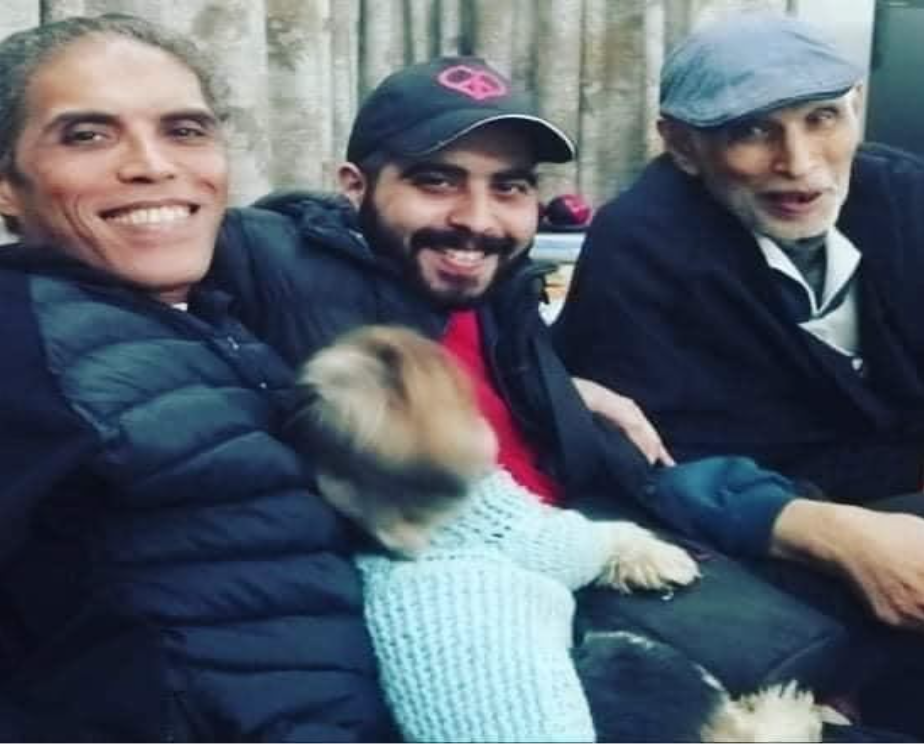
Detention conditions
The Ministry of Interior imprisoned Khaled Dawoud, Hassan Nafaa, and Hazem Hosni, all arbitrarily detained on September 24, 2019, in the same cell, Ward No. 1, in Liman Tora Prison.
In his interview with Rai Alyoum newspaper on April 12, 2020, Nafaa, whom security forces released from prison on March 20, 2020, stressed that their six square-meters prison cell was a "choking space." Nafaa stated that the prison administration banned the trio from reading newspapers. He said that guards did not allow political prisoners as much time to exercise as criminal prisoners had. Liman Tora Prison also did not allow political prisoners to have cooking utensils, electric devices, TV, and newspapers, in contrast to those accused of ordinary crimes. When the prison administration referred Nafaa to the prison's hospital after he suffered from vertigo, he stated that its hospital had:
[…] an unimaginable degree of negligence. I was horrified to find that another sick prisoner with some experience in nursing was the only person available at that time to measure [blood] pressure, draw a blood sample and do some first aid!!
- According to source A, Dawoud said that the cell had only one metal, double-story bed for the three prisoners. Given that Dawoud, at 53, was younger than Nafaa (73-years-old) and Hosni (69-years-old), he gave them the bed and slept on a blanket on the floor.
- The Egyptian Center for Economic and Social Rights (ECESR)published a report on December 8, 2019 documenting that Dawoud had repeatedly complained to the public prosecution about his detention conditions during various court sessions to investigate his involvement in the Case No. 488/2019. The ECESR report noted the detention conditions in Liman Tora Prison and the prison administration's ban preventing Dawoud from receiving personal belongings and clothes from outside the prison.
- On April 16, 2020, the Ministry of Interior posted avideo on its official Facebook page to showcase that it had taken all precautions and necessary measures to ensure that Egypt's prisons had no cases of COVID-19. The video featured a medical professional swabbing several detainees, including Dawoud and activist Ahmed Douma, for a COVID-19 PCR test.
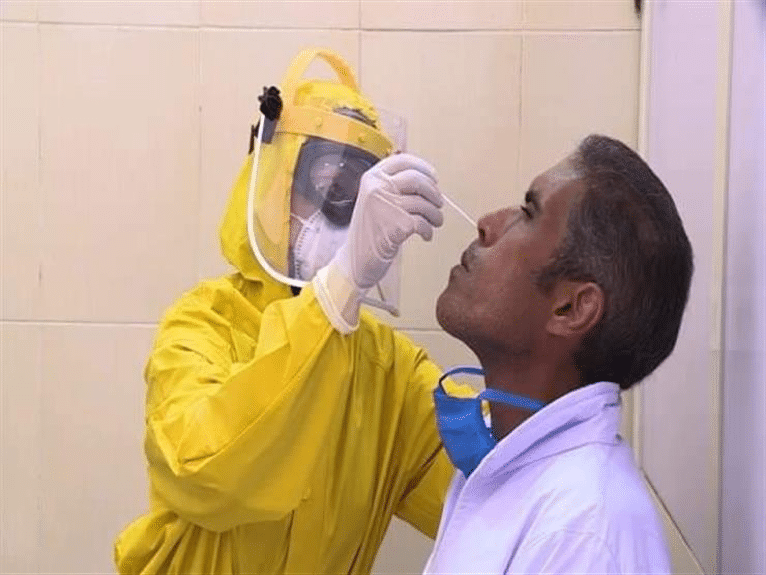
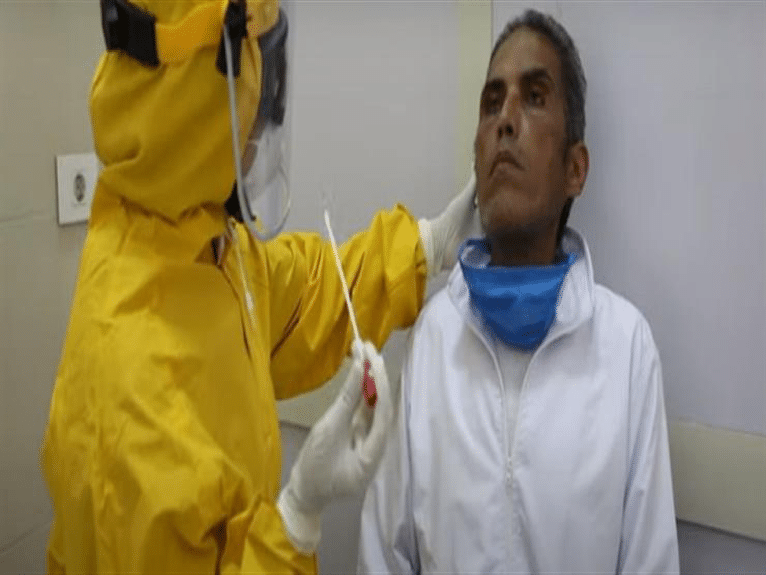
Source B told DAWN that since his arrest until the end of October 2019, the prison administration had banned Dawoud from exercising outside his cell. The source also said that the Liman Tora administration denied all of Dawoud's requests to get a fan, a radio, books, or newspapers to read.
According to one of Dawoud's lawyers, Khaled Ali, the Ministry of Interior permitted Dawoud, on May 15, 2020, "at the Iftar time" (fast-breaking time in Ramadan) "for 30 minutes" to visit his father and console him on the death of Dawoud's sister, Manal.
Impact on Family
- Source B contended that the SSSP has not permitted Dawoud to phone Basem, aged 11, hisonly son who resides in Morocco. The lack of communication has caused Dawoud and Basem's mental wellbeing to deteriorate, as they used to speak on the phone every day. The hope that security forces would soon release Dawoud led the family to tell Basem that his father is on a work trip in a place with no reliable Internet or mobile network coverage. However, the family later changed its mind and decided Basem needed to know that his father is in prison for his pro-democracy activism.
- Since March 10, 2020, the Ministry of Interior has banned inmates, including Dawoud, from receiving family visits as a precautionary measure against the spread of COVID-19 in the country's prisons.
- Both sources A and B confirmed to DAWN that in the past, Dawoud took care of his elderly father. Dawoud, therefore, had worries that something may happen to his father during his imprisonment. On February 4, 2020, Egyptian politician and TV presenter Gameela Ismail recorded a video message from Dawoud's father, Elsayed Ismail Dawoud, who suffers from a serious health condition. In the video, the elder Dawoud addressed his son and stated:
Habibi Khaled, I am talking to you now from my sickbed. I am very sick, Khaled. I wish you were here with me to support and care for me as you used to do. You are a [defender of freedom] with principles. You never betrayed the principles that you embrace […].
Habibi Khaled, we will meet each other [soon]. Freedom will be victorious. Justice will be victorious. Injustice will end. […] I am waiting for you, Khaled, come back quickly.
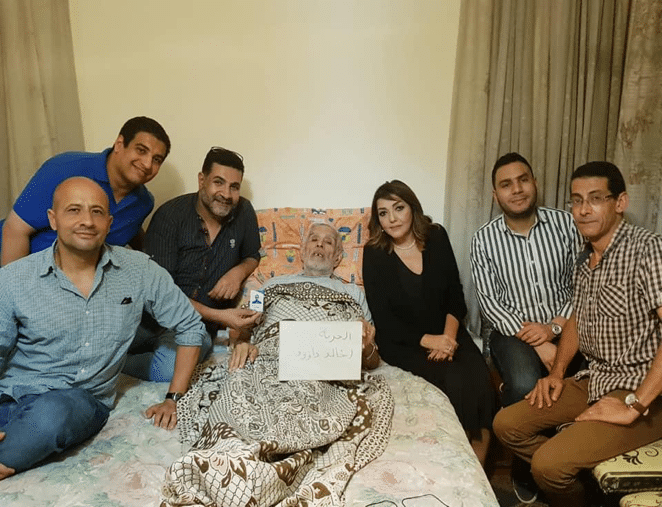
Dawoud's father, Elsayed Dawoud, in the middle surrounded by his friends, taken on November 11, 2019 (photo credit: Gameela Ismail)
· Dawoud was not able to see his sister, Manal, or bid her farewell before she died on May 15, 2020. After her burial, the Ministry of Interior allowed Dawoud to visit his sick father at home for 30 minutes. This was the first time Dawoud saw his father since his arrest on September 24, 2019. Pro-government media outlets such as Sada Elbalad and Youm7 lauded this "humane gesture" from the Ministry.
Violation of Rights
- The right to freedom and security
According to Dawoud's account to his lawyers, unidentified Security forces arbitrarily detained him on his way to visit his father on the evening of September 24, 2019. The captors did not identify themselves. They did not present Dawoud with an arrest warrant; or inform him of the reasons for his arrest. They did not allow him to contact a lawyer or family member.
[Article 14, Arab Charter on Human Rights; Article 9 (1), International Covenant on Civil and Political Rights (ICCPR); Article 3, 9, Universal Declaration of Human Rights (UDHR)]
- The right not to be subjected to enforced disappearance
Security forces arrested Dawoud on September 24, with no warrant, and detained him at an undisclosed location between the evening of September 24 and the afternoon of September 25, 2020. Only then did they bring him before an SSS prosecutor and detail the charges against him.
The UN definition of enforced disappearance as stated in Article 2 of the International Convention for the Protection of All Persons from Enforced Disappearance (CED) does not include a time dimension which indicates that enforced disappearance as a crime is constituted from the moment of abduction of the victim. Differently, the International Criminal Court's definition, as stipulated in Article 7 (2, i) of the Rome Statute of the International Criminal Court, considers enforced disappearance as a crime when it occurs "with the intention of removing [the victim] from the protection of the law for a prolonged period of time." For more information, see Philip Linghammar's Time for Enforced Disappearance to Disappear (pp. 11-13).
[International Convention for the Protection of All Persons from Enforced Disappearance (Convention CED); Principle 1, 6, Principles on the Effective Prevention and Investigation of Extra-legal, Arbitrary and Summary Executions]
- The right to humane and dignified treatment
Until early 2020, Dawoud complained about his detention conditions in Liman Tora Prison. The prison administration banned Dawoud from receiving personal belongings and clothes from his family, from exercising outside his cell, and from reading newspapers. As mentioned in Hassan Nafaa's interview above, the prison administration treated criminal and convicted prisoners better than Dawoud and other political prisoners in remand detention.
Nevertheless, on April 16, 2020, the Ministry of Interior conducted a COVID-19 PCR test for Dawoud and permitted him, on May 15, 2020, to visit his severely ill father for 30 minutes, following the death of Dawoud's sister, Manal.
[Article 15, 16, 30, Egypt's Prisons Organization Law No. 396 of 1956; Article 55, 56, Egypt's Constitution; Article 5, African Charter on Human and Peoples' Rights; Article 5, UDHR; Article 7, ICCPR; Article 1, Convention against Torture and Other Cruel, Inhuman or Degrading Treatment or Punishment (CAT)]
- The right to a fair trial
The decisions of the SSSP and the Terrorism Circuits to keep Dawoud in pre-trial detention violate the Egyptian Code of Criminal Procedure, as the courts made these decisions in his and his lawyers' absence on multiple occasions.
According to Article 136 of the Code of Criminal Procedure No. 150 of 1950, and amended by Law 145 of 2006, "The investigating judge must, before issuing a detention order, hear the statements of the Public Prosecution and the defense of the accused." Article 142 stipulates, "Pre-trial detention ends after the 15 days have passed since the accused is imprisoned, yet the investigating judge may […] and after hearing the statements of the Public Prosecution and the accused, issue an order to extend the imprisonment for similar periods so that the detention period does not exceed a total of forty-five days." The indispensability of hearing the detainee's defense is further highlighted in Article 143 as well.
In line with regional and international legal provisions, the Egyptian lawmaker envisaged pre-trial detention as an exceptional and timed measure to guarantee the integrity of the preliminary investigation by placing the accused at the disposal of the investigator whenever the investigation requires preventing the former from escaping or tampering with the evidence of the case or affecting witnesses, or saving him from retaliation by others. For this reason, the Lawmaker made hearing the defendant's defense in person or through his lawyer a fundamental requirement for extending pre-trial detention beyond its stipulated duration. Therefore, all the decisions to renew Dawoud's pre-trial detention in May and June have no legal validity.
[Article 77, Egypt's Prisons Organization Law No. 396 of 1956; Article 96, Egypt's constitution; Article 13, 14, 16 Arab Charter on Human Rights; Article 7, African Charter on Human and Peoples' Rights; Article 14, ICCPR]
o The right to defense and legal representation [Article 54, Egypt's constitution; Article 16 (3, 4) Arab Charter on Human Rights (ACHR); Article 14 (3 b, d), ICCPR; Section A, article 2 (f), Principles and Guidelines on the Right to a Fair Trial and Legal Assistance in Africa; Principle 17 (1, 2), 18, Body of Principles for the Protection of All Persons under Any Form of Detention or Imprisonment; Rule 93, Standard Minimum Rules for the Treatment of Prisoners; Principle 7, 8, Basic Principles on the Role of Lawyers]
o The right to reasonably-timed trial or release [Article 54, Egypt's constitution; Article 14 (5, 6) Arab Charter on Human Rights; Article 9 (3) ICCPR; Principle 37, 38, Body of Principles for the Protection of All Persons under Any Form of Detention or Imprisonment]
- The right to physical and mental health
Dawoud complained to the SSSP several times about his detention conditions. His cell, as described earlier by his cell-mate Hassan Nafaa, was a "choking space" with poor hygiene, poor ventilation, and a paltry water supply. The prison administration deprived him of his exercise time. However, the Ministry of Interior did conduct a COVID-19 PCR swab test for Dawoud and other inmates on April 16, 2020. Hassan Nafaa also described the negligence in the prison's hospital as "beyond imaginable."
[Article 33, Egypt's Prisons Organization Law No. 396 of 1956; Article 18, 55, Egypt's constitution; Article 14 (4) Arab Charter on Human Rights; Article 25 (1), UDHR; Article 12 (1), ICESCR; Principle 9, Basic Principles for the Treatment of Prisoners; Principle 24, Body of Principles for the Protection of All Persons under Any Form of Detention or Imprisonment]
- The right to communicate with the outside world, especially with his family
For almost a year, since his arrest on September 24, 2019, the prison authorities have not allowed Dawoud to speak to or learn anything of his only son, Basem, who lives in Morocco. Between March 10 and August 22, 2020, Liman Tora administration banned Dawoud and other political prisoners from family visits and letters as part of the Ministry of Interior's stated measures to combat the spread of COVID-19 inside Egypt's prisons.
Dawoud did not have the opportunity to see his sister Manal or bid her farewell before she died on May 15, 2020. On this day, the Ministry of Interior did allow Dawoud to see his father for the first time since his arrest.
[Article 38, Egypt's Prisons Organization Law No. 396 of 1956; Article 54, Egypt's constitution; Article 21, Arab Charter on Human Rights; Article 12, UDHR; Article 17 (1, 2), ICCPR; Principle 19, Body of Principles for the Protection of All Persons under Any Form of Detention or Imprisonment; Rule 37, 39, 79, 92 Standard Minimum Rules for the Treatment of Prisoners].
Officials Involved in Prosecution and Detention
- Hamada al-Sawy, General Prosecutor of Egypt
Prosecutor al-Sawy neglected to investigate any of the petitions and pleas submitted to his office by Dawoud's lawyers with regard to his unlawful detention and the Second Terrorism Circuit's extension of his pre-trial detention for 45 days on May 5 and for an additional 45 days on May 6, 2020.
- Khaled Diaa el-Din, First Attorney General of the SSSP
All SSSP decisions permitting and extending the unlawful pre-trial detention of Dawoud list Counselor Diaa el-Din. Lawyers who specialize in SSSP cases told DAWN that the SSSP issues all of its decisions in the name of the First Attorney General of the SSSP. It does not use the names of the interrogators or prosecutors who actually questioned the defendants.
- Moataz Khafagy, Head of the Second Terrorism Circuit of the Giza Criminal Court
Judge Khafagy extended Dawoud's unlawful pre-trial detention on May 5 and 6 and June 15, 2020 even though no evidence was presented to establish any of the statutory conditions for pre-trial detention as stipulated in Article 134 of Egypt's Code of Criminal Procedure. The absence of the reasons for his decisions to extend Dawoud's pre-trial detention violated Article 136 of Egypt's Code of Criminal Procedure which stipulates that:
Before issuing a detention order, the investigating judge must hear the statements of the Public Prosecution and the defense of the accused. The detention order must include an explanation of the crime attributed to the accused, the penalty prescribed for it, and the reasons upon which the order is based. The provision of this article shall apply to orders issued to extend pre-trial detention, in accordance with the provisions of this law.
Judge Khafagy made all these decisions without Dawoud's presence and on May 5 and 6 without his or his lawyers' presence. These decisions, therefore, violated Articles 136 and 143 of Egypt's Code of Criminal Procedure which stipulate that "before issuing a detention order," the investigating judge must hear "the statements […] of the defense of the accused," and that "extending remand detention" must be preceded by hearing "the statements of […] the defendant."
Khafagy extended Dawoud's pre-trial detention for 45 days on May 5, 2020 and then again for 45 days on May 6, 2020, indicating disregard for the details of the case and the individual circumstances of the defendant.
- Mohammed Saeed el-Sherbiny, Head of the Fifth Terrorism Circuit of the Cairo Criminal Court
Judge el-Sherbiny extended Dawoud's unlawful pre-trial detention on July 26, 2020 even though no evidence was presented to establish any of the statutory conditions for pre-trial detention as stipulated in Article 134 of Egypt's Code of Criminal Procedure. The absence of the reasons for his decision to extend Dawoud's pre-trial detention violated Article 136 of Egypt's Code of Criminal Procedure which stipulates that:
Before issuing a detention order, the investigating judge must hear the statements of the Public Prosecution and the defense of the accused. The detention order must include an explanation of the crime attributed to the accused, the penalty prescribed for it, and the reasons upon which the order is based. The provision of this article shall apply to orders issued to extend pre-trial detention, in accordance with the provisions of this law.
- Rafaat Zaki, Member of the First Terrorism Circuit of the Cairo Criminal Court
Judge Zaki extended Dawoud's unlawful pre-trial detention on October 31, 2020 even though no evidence was presented to establish any of the statutory conditions for pre-trial detention as stipulated in Article 134 of Egypt's Code of Criminal Procedure. The absence of the reasons for his decision to extend Dawoud's pre-trial detention violated Article 136 of Egypt's Code of Criminal Procedure.
International Reactions
- On September 27, 2019, Reporters Without Borders (RSF)condemned the arrest of Egyptian journalists, including Khaled Dawoud. On October 28, 2019, RSF issued a statement calling on the German Foreign Minister Heiko Maas to "condemn in the clearest terms the latest wave of repression against journalists during his talks in Egypt." The statement introduced Dawoud to Minister Maas as:
A long-time editor of the English-language state-run Al-Ahram Weekly. Since the Mubarak era he has repeatedly reported on human rights violations in Egypt and has publicly criticized both the policies of the Muslim Brother Mohammed Morsi, who was ousted from the presidency in 2013, and the repression under current president Abdel Fattah al-Sisi. In the past, he also worked for German media such as ARD and the German Press Agency (dpa).
· Nabil Fahmy, former Egyptian foreign affairs minister (July 2013 – June 2014) and the Dean of the School of Global Affairs and Public Policy at the American University in Cairo (AUC), expressed on October 31, 2019, via the Caravan, "His deep concerns at the continued detention of colleague and adjunct professor Khaled Dawoud, and called on the authorities to work toward his release that he may resume his teaching duties and be reunited with his family as soon as possible."







































